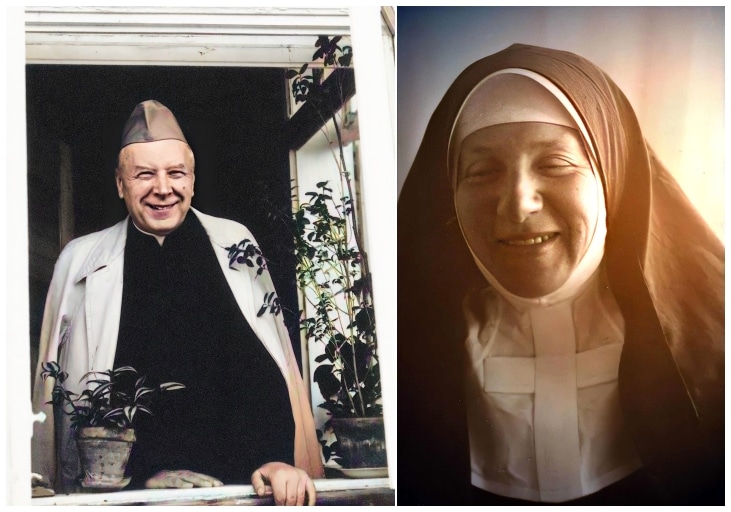“I think that Mother Czacka could certainly be the patroness of the visually impaired, those who experience the drama of suffering, but perhaps also of all those who have problems seeing what is most important, those who are searching for truth, those who search for God, those whose souls need light even though their eyes can see,” said Sr. Alberta Chorazczewska of the Congregation of the Franciscan Sisters Servants of the Cross, co-author of the Positio in the beatification process of Mother Elżbieta Róża Czacka, in an interview for the weekly Echo Katolickie. The beatification of Cardinal Stefan Wyszyński and Mother Rosa Maria Czacka is scheduled for September 12th of this year. It will take place in Temple of Divine Providence in Warsaw.
Although from the human perspective the loss of sight at the age of 22 is a tragedy, for Róża Czacka it was the grace of God on which she built her great work. She became not only a pioneer of modern methods of education and assistance for the blind in Poland but also a person who, basing her life totally on God, influenced many people.
Róża Czacka was born into an aristocratic family on 22 October 1876, in Biala Cerkiew (now Ukraine). “The values professed in the family and passed on from generation to generation became the natural foundation on the faith and personality of Róża Czacka, the future Mother Elżbieta, matured,” emphasized Sr. Alberta Chorążyczewska.
Róża Czacka had problems with her eyesight since her childhood. An unfortunate fall from a horse contributed to its complete loss. Her ophthalmologist said: “Do not let yourself to be driven to any foreign celebrities, because there is nothing to be done here anymore, the state of your eyesight is hopeless.” He added another important sentence: “Take care of the blind in Poland, for there are many and nobody takes care of them. You have these possibilities.” These words awakened in Róża a desire to help the blind.
For 10 years, Countess Róża travelled around Europe, where she gained knowledge in centers for the blind. At first, she helped individuals she sought out in hospitals. In 1910, she founded the first institution for blind girls. In 1910, she founded the Society for the Care of the Blind, whose charter was approved by the tsarist authorities in May 1911. “Róża tried to convince society that an educated blind person could be a valuable citizen, and she also assured the blind themselves that they were capable of independent work. And although life brought her very painful experiences, she surprised those around her with her cheerfulness and kindness. She crossed borders of the impossible, broke stereotypes, created new things,” said Sr. Alberta.
In 1915. Róża went to visit her brother in Wołyń. The warfare stopped her there. She decided to stay in Zhytomyr and spent 3 years there. She began a solitary novitiate in the Third Order of St. Francis, giving up the habits she had as a countess. After a year, she made her first vows, then her perpetual vows, taking the Franciscan habit and the name Elżbieta. She returned to Warsaw. Soon, she lived among the blind. Sr. Elżbieta undertook efforts at the Warsaw curia to open a chapel in the institution and to obtain permission to establish a religious congregation. “As a countess she had previously been welcomed here, but as a blind nun, she became an intruder. ‘A blind woman wanted to start a religious order,’ said one member of the Curia. Thanks to her humility and perseverance she soon received verbal permission from Cardinal Kakowski to receive candidates to the new congregation. December 1st, 1918 is considered the date of founding the Congregation of Franciscan Sisters Servants of the Cross, whose charisma is to serve the blind in body and soul and to compensate for the spiritual blindness of the world,” explains Sr. Alberta.
In 1922, thanks to a donation of three acres of wasteland in Laski, Mother Elżbieta started building a center for the blind. As Sr. Alberta noted, “today Laski is about 80 hm2 of land; primary, secondary, and post-secondary schools, boarding schools, libraries, a kindergarten, and a retreat house.”
On September 25th, 1939, during the bombing of Warsaw, Mother Elisabeth was seriously wounded and the operation to remove her eye was performed without anesthesia. However, she soon returned to Laski and managed the institution throughout the war, supporting the Kampinos units of the Home Army and the Warsaw Uprising. After 1945, she supervised the reconstruction of Laski. In 1950, she handed over the government of the Congregation to her successor. After that, she supported the work with prayer and suffering. She died on May 15th, 196,1 in the reputation of holiness. Disability did not become an obstacle for her, it did not break her, but it was the beginning of a fuller life. Mother Czacka became a spiritual guide for many people.
Cardinal Stefan Wyszyński and Mother Elżbieta Czacka were friends. Beginning with his first visit to Laski, Father Wyszynski became involved in many of the undertakings there. He had the opportunity to observe the ministry of Father Kornilowicz – spiritual guardian and co-creator of the center – and Mother Elisabeth Czacka. His memories shed valuable light on the person of Mother Czacka died on May 15th, 1961. Her funeral was presided over by Primate Stefan Wyszyński.
Echo Katolickie / Family News Service










